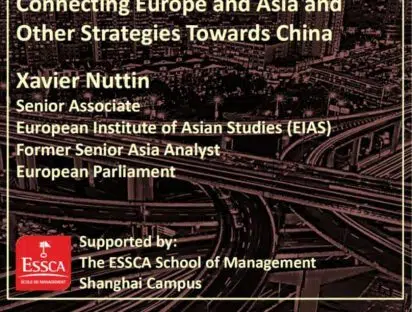A conference report on EU-China relations by Antonella Forganni.
On 10 October the University of Bologna (Italy) hosted the final workshop of the 2014 China-EU School of Law research project: “EU-China Disputes on Trade Remedies, Climate Change and Natural Resources: A Legal Analysis for A Better Legal Framework and Cooperation”. The event brought together several European and Chinese scholars that provided a comprehensive overview of the EU-China trade disputes in light of the new challenges faced in the field of sustainability. The different legal analyses focused of four main issues:
- investments (by Elisa Baroncini, Pieralberto Mengozzi, Federica Cristani),
- climate change (by Wang Lebing, Gong Hongliu, Coraline Goron),
- natural resources (by Ilaria Espa, Elisa Baroncini, Elisa Ruozzi) and
- trade defence (by Li Juqian, Claudio Dordi, Antonella Forganni, Liu Jingjing).
The University of Bologna is known as the world’s oldest university; since its establishment in 1088 it has provided a unique intellectual environment for the studies in Roman law (with the first authoritative jurist, Irnerius) and then, more generally, for the studies in the different legal domains. A very appropriate venue, considering that, within the Roman law indeed, the first legal notions of international trade had been elaborated, as underlined by Elisa Baroncini, scientific coordinator of the project and Associate Professor of International Law at Bologna University.
In a nice semantical coincidence, it was in the Sala delle armi (“Hall of weapons”) of the Bologna School of Law, where the Chinese and European scholars discussed the “legal weaponry” used by China and the EU in their trade relations. The aim of the research project is to provide a better understanding of the interests at stake to highlight the possible ways to overcome the existing conflicts, considering that EU-China cooperation is for mutual benefit.
Investments represent today a strategic subject to enhance the trade relationship: the first panel outlined the shortcomings of the on-going negotiations for a Bilateral Stand-Alone Investment Agreement, presented the main legal issues and their possible consequences on the trade relations. State-owned enterprises, sovereign wealth funds, pre-and post-establishment investments are some of the critical aspects analysed.
Secondly, climate change is one of the political priorities both for China and the EU, thus it may represent a shared ground for mutual support and cooperation. However, the legal notions related to environmental goods in the Chinese and EU law are substantially different. Furthermore, climate change is strictly linked to energy policies, which often call for green subsidies. These instruments strongly affect the EU-China trade relations.
The third panel focused on natural resources, a field where the EU-China relations become even more complicated. Indeed, they are both great producers, consumers and competitors in the energy field. Against this backdrop, the trade dispute concerning the solar panels has highlighted the existing clashes between industrial and environmental interests. It is one of the numerous examples that show the limits of considering trade policy as an isolated and autonomous policy. Two other issues were also illustrated: the WTO case on rare earth elements and the Chinese biofuel policy. In both of them, the trade and environmental concerns are intertwined.
Finally, a specific section was dedicated to the trade defence measures, a traditionally sensitive issue in EU-China relations. The recent major disputes before the WTO Dispute Settlement Body and the European Court of Justice were outlined, as well as the main legal issues, such as the EU’s refusal to grant the market economy status to China. Space was given to the recent initiatives of reform of the EU trade defence instruments, which will especially affect the future antidumping practice and re-shape the EU-China relations in this field.
The conference was closed by Paolo Mengozzi, Advocate-General of the European Court of Justice, who emphasized the importance of a strong legal framework for EU-China relations and the need of keeping alive the dialogue between the EU and China on legal issues. That is made possible also through common research projects, such as the one at the origin of the conference. Furthermore, he stressed the persistent regard of the judges and each advocate-general of the European Court of Justice towards the decisions issued by international dispute settlement bodies (among others, the WTO). This attitude allows keeping constantly abreast of international trends, avoiding the isolation of the European Union, as regional system, from the rest of the international community.
The research findings will be included in a collective publication for the “China-EU School of Law Book Series”, which will be released by Springer publications in early 2015.
Please consult or download the complete programme of the conference here.





